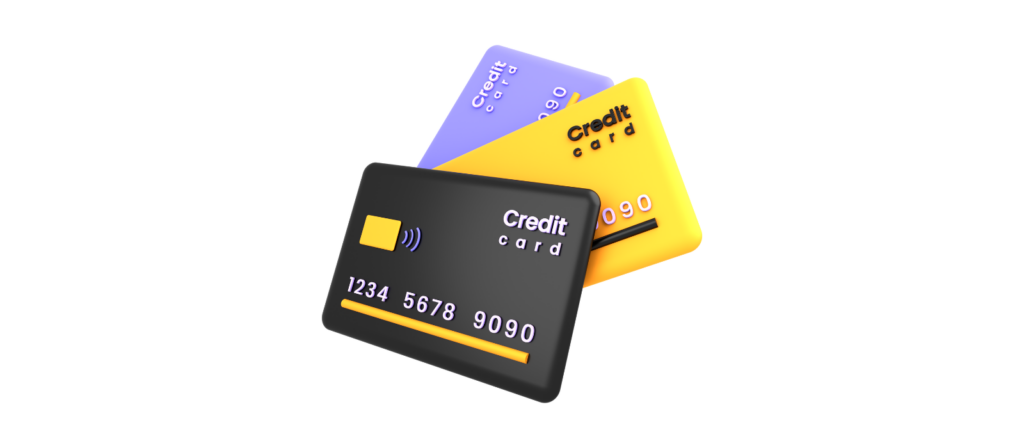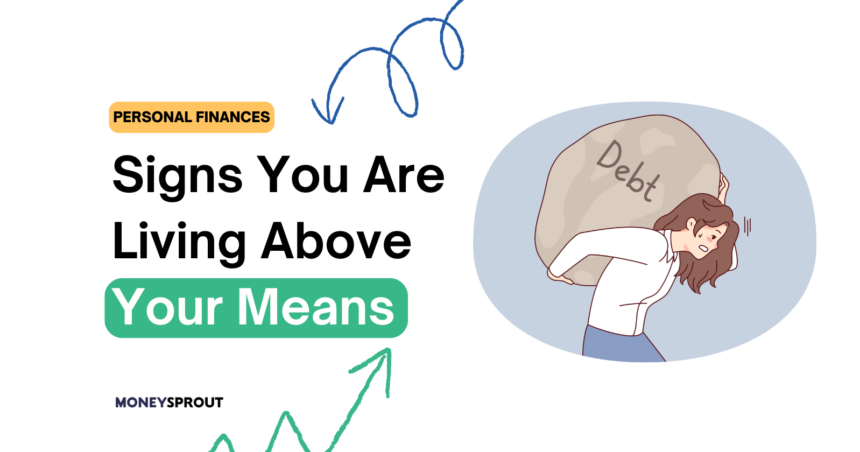British consumers will have to weather the storm of increased prices during 2024, with food inflation skyrocketing to the highest levels since 1977.
However, increasing food prices are only the tip of the iceberg. A survey by Statista revealed that 90% of households reported cost-of-living increases driven by more than just higher food bills. Consumers also reported rising gas and electricity costs, public transport, childcare, and rent or mortgage hikes.
With all these financial pressures, it’s easy to spread yourself too thin Here are 8 signs that you’re living above your means and way you can ease the financial stress.
1. Minimum Credit Card Payments

Chances are you have a credit card or two in your wallet or handbag. If you’re only making the minimum monthly payment then chances are that you may be living above your means. Credit card debt can be crippling, and the costs of servicing it are only going to get higher.
The repayment challenge is more pressing if you’re only making minimum payments. If that sounds familiar, then you may need to rein in your spending. Do you really need another cashmere sweater or pair of designer jeans?
Any payment in excess of your minimum contribution to your credit card bills can make an enormous difference to your life. Settling those debts as quickly as possible will mean freeing up money that could be better used elsewhere. Remember that unsecured debt (like your credit card debt) is subject to substantial charges and high interest rates – the sooner you settle the balance the better.
It’s also worth remembering that regular monthly payments above the bare minimum required will pay enormous dividends in the long run. Any amount, no matter how small, can have a considerable impact on the interest you’re paying and it can also decrease your credit repayment period.
Small steps can make the process much easier. Focus on one credit card until the debt is settled. Then turn your attention to the next credit card debt. Rinse and repeat. – You’ll be amazed at the difference this approach can make to your finances.
If you are serious about your finances, I would recommend paying off the balance in full each month, so you never have to pay interest. For most people, the easiest way to avoid credit card debt is to not have a credit card at all.
2. A Stagnating Savings Account
Your savings account is your insurance policy against a rainy day, and making regular monthly deposits to top up the account is essential. If you find yourself skipping on the payments, it’s a sign that you’re living above your means. In this case, cutting down on the “wants” and prioritising the “needs” makes sense. Give fast food delivery service a miss this month, or forsake your weekly nights out with friends.
For many people, the thought of putting money aside to service future needs is a discipline that can be difficult to master. It’s not always easy to motivate yourself to save when the rewards of your efforts will only become apparent years down the line. As they say, the future is foreign land, who knows what it will bring? But that’s the whole point. The concrete actions you take today to ensure your financial security in your golden years will give you peace of mind and security.
3. Inadequate Retirement Contributions
You may be one of the approximately 90% of Britons who aren’t saving enough (or at all) for their golden years. According to financial experts, you should be putting around 15% of your earnings into retirement savings. The challenge that many people face is the temptation to simply stop their retirement contributions when they’re under financial pressure. Although your retirement savings or pension plan contributions may seem unimportant at present, a lack of savings will have a devastating effect on your quality of life in the future.
For that reason, it’s essential that you factor retirement contributions into any budgeting exercise. I would recommend reading my article on the power of compound interest so you can see how important it is to invest early and often.
4. Living From Monthly Salary to Monthly Salary
The sinking feeling when viewing your bank balance at the end of the month is unfortunately all too common for many people. Recent research by Virgin Media O2 reveals that more than 30% of workers in the U.K. are only one monthly salary payment away from serious financial hardship.
If you find yourself out of cash halfway through the month, then some strict budgeting is required. Review your expenses and cut out anything non-essential. Don’t spend on big-ticket items like a vacation unless you’ve saved up for it. Much more importantly, don’t rely on credit. Paying it will only increase your monthly expenses over the medium- to long-term.
5. An Out of Control Bank Balance
If you have ever stepped up to a cashpoint and been shocked to discover that your account balance is nowhere near as healthy as you thought, you may be living beyond your means. This is especially true when you simply have no idea where the money has gone.
Make sure that you reduce your stress levels and increase the availability of household finances by budgeting. There are some extremely powerful apps (many free) that can help you cut down on expenses, save, and enjoy a stress-free lifestyle.
If you want something even easier to track your spending, I would recommend checking out our budget template for google sheets.
6. Considering a Short-Term or High-Interest Loan
It’s easy to fall into the debt trap, especially when under financial pressure. If you’re considering getting a high-interest loan (like a payday loan) you may be swapping out current financial pressure for long-term financial pain. Don’t add to your worries if you’re already struggling with money. Have a long, hard think about why you need the loan. It’s often the case that carefully considered budgeting can eliminate many sources of chronic financial strain. If you have the time, consider a side-hustle that can supplement your income.
Side-hustles are becoming increasingly popular in these financially trying times. Fortunately, there are numerous opportunities to explore. A good rule of thumb is to leverage your strengths and interests. If you can write, there are gigs available on many freelancing sites. Also, private meal delivery services are in great demand. Join a farmer’s market and sell your home grown organic produce, or harness your passion for arts and crafts and sell your original creations online.
The world is your side-hustle oyster. However, make sure that the time you spend earning that much-needed extra income doesn’t affect your ability to meet the responsibilities of your day job. And try to keep a healthy work/life balance.
7. Justifying Unnecessary Spending
If you’ve ever found yourself thinking “but I deserve it” in connection with a purchase, then there’s a good chance that the money isn’t being spent on necessities. Do you need the latest, greatest phone, or is last year’s model more than adequate? Retail therapy is never the answer to personal fulfilment – and it’s certainly not the solution to a cash flow crisis.
If you find yourself falling into this trap, draw up some financial goals. Make them clear and achievable (the latest phone costs X, therefore I need to put away Y each month). Make sure to meet the goals that you have set out for yourself and track your progress each month.
8. Ignoring Bills
When it comes to your financial obligations, an “out of sight, out of mind” approach isn’t going to provide you with financial stability. Simply ignoring that growing pile of bills will have unpleasant ramifications, including legal action and damage to your credit rating.
When you have an increasing sense of dread about a backlog of bills, you need a solid financial plan. Remember, when it comes to debt, communication is key. Let your creditors know that you’re facing challenges when it comes to monthly repayments. You may be surprised at how many are willing to renegotiate repayment terms. This can be a first step towards lowering your stress levels and being able to afford a better quality of life.
Wrapping Up
A recent survey of 2,250 British respondents by the Centre for Economics and Business Research (CEBR) made some revealing discoveries. Worryingly, only around 5% of Britons were able to answer simple questions about financial topics, including those related to their personal finances.
Unfortunately, educational institutions don’t prioritise financial education – and life can sometimes be an unforgiving teacher. However, it’s never too late to take control of your personal finances.
If you spot any of the 8 signs that you’re living beyond your means, it’s time to take a more proactive approach to your finances.
Ultimately, financial freedom requires both discipline and planning. Focus on what you need and not what you want, and stick to a carefully considered budget. You’ll be surprised at how quickly you can turn a financial corner and get your life back on an even keel.
Read More From Money Sprout:



